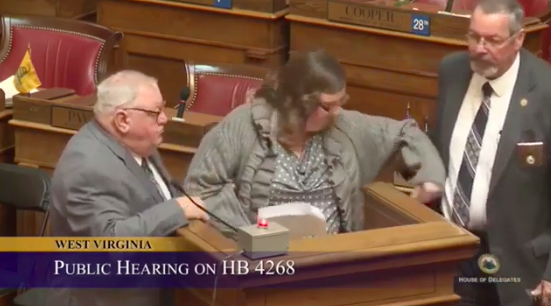On Friday, February 9, Lissa Lucas — a Democratic Party candidate for West Virginia’s House of Delegates — was forcibly removed from a Senate hearing for calling out how many thousands of dollars legislators backing a pro-oil and gas industry bill have received from that very industry.
The video of Lucas’s public comment and removal has gone viral and served as a launching pad for her campaign, which has raised more than $46,000 since the incident. Previously, she had raised just over $4,000. Coincidentally, Lucas supports a publicly funded campaign finance system.
The bill (HB 4268) she opposed, however, has passed in the West Virginia House of Delegates.
That law, “forced pooling” legislation which makes it easier for the oil and gas industry to obtain mineral rights from private landowners as a precursor to drilling, has the support of the West Virginia Oil and Natural Gas Association. It enables oil and gas companies to perform more hydraulic fracturing (“fracking”) on private land in the state by mandating that, rather than securing land lease contracts from all landowners, companies only need 75 percent of those living in an area to sign leases and are granted the remaining 25 percent by default.
Appalachian Storage Hub Advances
Beyond HB 4268, in the days surrounding Lucas’s removal from the hearing, both the West Virginia legislature and congressional delegation took steps to advance a proposal that would create a petrochemical storage and refining hub in the state, which would be fueld by fracked oil and gas development in the region’s Marcellus and Utica shale basins.
That hub is set to receive $83.7 billion in capital from China, an agreement finalized in a ceremony overseen by President Donald Trump and Chinese President Xi Jinping and which took place during a U.S. Department of Commerce trade mission to China in November.
On February 7, one day after DeSmog published an investigation on the proposed Appalachian Storage Hub, which would also cover Kentucky, Ohio, and Pennsylvania, the West Virginia House of Delegates introduced a resolution (H.R. 7) calling on Congress to pass various pieces of legislation which would create favorable regulatory conditions for the hub. This was also one day before Lucas was ousted from the hearing on the forced pooling bill.
The same day as the Lucas incident, U.S. Sen. Joe Manchin (D-WV), a major backer of the federal bills, co-wrote a letter asking the Senate Appropriations Committee to support and continue funding the Department of Energy’s Title XVII loan guarantee program, which came under scrutiny after providing a $535 million loan to the ill-fated solar company, Solyndra. The Energy Department, as DeSmog previously reported, is considering offering a $1.9 billion loan guarantee to develop the petrochemical hub in West Virginia, a move lauded by Manchin, who is up for re-election in November.
In his office’s press release about the letter supporting the loan guarantee program, Manchin explicitly linked the funding request with the prospective creation of the petrochemical hub in his state.
“The Title XVII Innovative Loan Guarantee has a successful track record of helping finance innovative American energy technologies,” reads the press release. “In 2017, Senator Manchin introduced the Capitalizing American Storage Potential (CASP) Act to ensure a regional storage hub, like the proposed Appalachian Storage Hub, is eligible for the Department of Energy’s successful Title XVII loan guarantee program.”
The proposed state bill, H.R. 7, requests that Congress “renew its support for and fully fund the Department of Energy’s highly successful Loan Programs Office.”
Credit: West Virginia Legislature
The day after introducing the Appalachian Ethane Storage Hub Study Act, Manchin received a $10,000 campaign contribution from the American Chemistry Council — a major lobbying force behind the prospective hub whose members include ExxonMobil, Shell Oil, Chevron, Dow Chemical, and Monsanto. The Storage Hub Study Act is among those supported by the West Virginia House of Delegates resolution.
The American Chemistry Council recently announced that the Chinese state-owned petrochemical company Wanhua Chemical had joined as a dues-paying member, giving it new powers to influence the U.S. political and electoral systems via the trade group.
‘About Human Decency’
The West Virginia law on forced pooling, which Lucas was protesting, will now proceed to a Senate vote. Republican Governor Jim Justice, a former coal mining executive, is expected to sign it should it reach his desk. Opponents of the bill, above and beyond Lucas, have strong words explaining why they believe it should get the ax.
“We need to reject this bill. Let’s start valuing our people and stop making it quicker and easier for multi-million dollar companies to take advantage of people in our state,” Delegate Joe Canestraro said of his reasons for coming out against the bill on the House of Delegates floor. “It’s about human decency, ladies and gentleman.”
Main image: Democratic Party candidate for West Virginia’s House of Delegates Lissa Lucas as she is removed from a state Senate hearing. Credit: West Virginia House of Delegates
Subscribe to our newsletter
Stay up to date with DeSmog news and alerts







